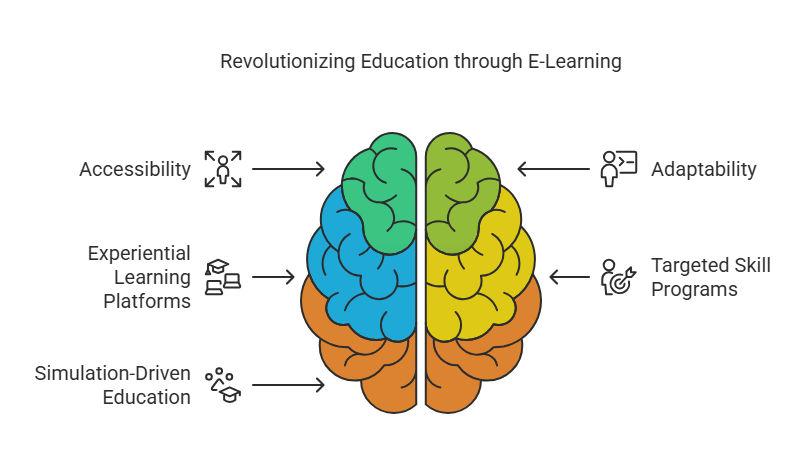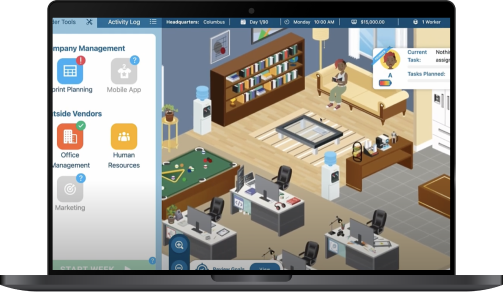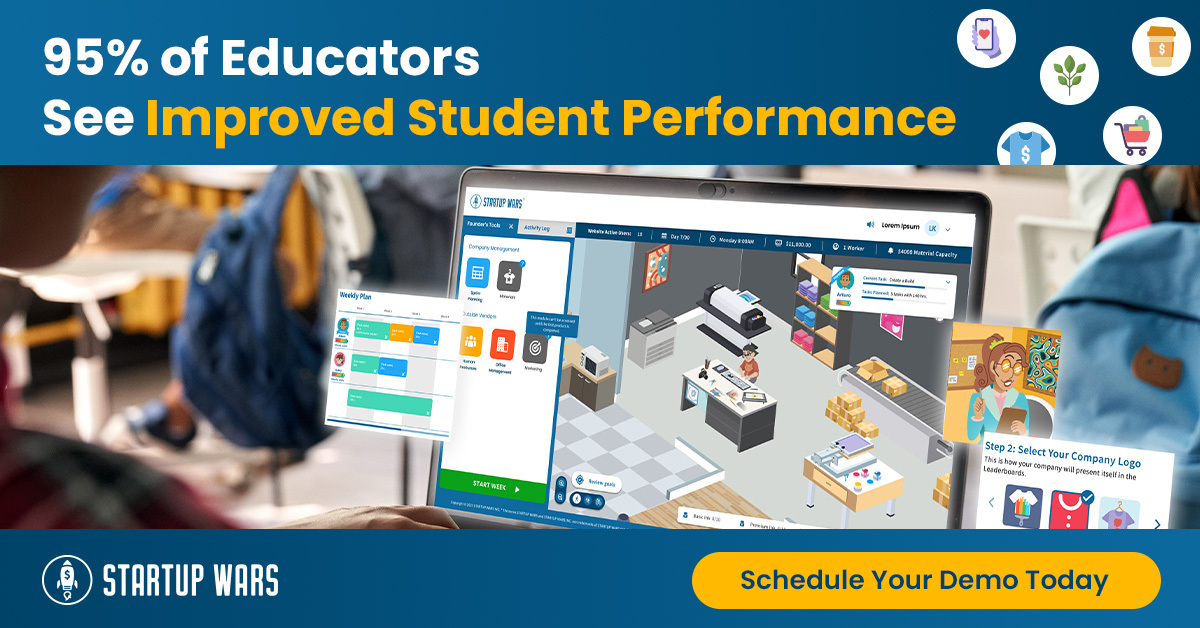Tackling the College Enrollment Decline with Online Platforms and Business Simulation Tools in Higher Education.
Table of Contents
Innovative Solutions to Address the College Enrollment Decline
Colleges and universities are at a crossroads, facing a dramatic decline in enrollment that challenges the very foundation of traditional education.
Higher education in the United States is grappling with a significant challenge: a persistent college enrollment decline. Since 2010, traditional higher education enrollment has fallen by approximately 15%, with a sharper drop observed during the COVID-19 pandemic. This “enrollment cliff,” driven by demographic shifts, a decline in high school graduates, and rising tuition costs, has left many institutions struggling to fill classrooms and maintain their budgets. Business education, once a cornerstone of university programs, is particularly vulnerable as students demand practical, career-relevant skills over theoretical knowledge.
Today’s students are reshaping higher education enrollment trends by prioritizing flexible, affordable, and results-driven learning options. Increasingly skeptical of traditional degrees, many are turning to online education platforms, boot camps, and micro-credentials that offer targeted, skill-based training. 70% of students say online learning is better than traditional classroom learning. The growing preference for personalized, experiential learning experiences reflects a broader trend: students expect education to deliver tangible outcomes that align with their career aspirations.
Online education trends have emerged as a powerful tool to address declining student enrollment, meeting the demand for accessible, skill-oriented education. By integrating business simulations, interactive tools, and customizable learning experiences, these platforms are meeting the demands of modern learners while enabling institutions to remain competitive. For business educators, online tools represent an opportunity to enrich their curriculum with practical, real-world applications that resonate with students and prepare them for industry challenges.
Understanding the Decline College Enrollment

As colleges face a sustained decline in enrollment, understanding the root causes and their specific impact on business education is essential for identifying effective solutions.
Key Drivers of the College Enrollment Decline
The college enrollment decline has become a critical issue for higher education institutions. Since 2010, total higher education enrollment has dropped by approximately 15%, marking a continuous trend exacerbated by several factors:
- Rising Tuition Costs: Over the past decade, tuition fees have outpaced inflation, making higher education unaffordable for many families. According to a Board Report on College Tuition Trends, the average cost of tuition and fees for private universities in 2023 was $39,400 annually, while public universities averaged $10,940 for in-state students.
- Skepticism About Traditional Degrees: Rising costs and uncertain returns on investment have led many students to question the value of a four-year degree. According to a 2022 Strada Education Network survey, 62% of working-age Americans believe that non-degree pathways, such as Startup Wars and certifications, can provide the skills needed for career advancement just as well as a college degree.
- The Rise of Alternative Pathways: Online education trends, coding bootcamps, micro-credential programs, and experiential learning opportunities are gaining popularity. These options offer faster, more affordable, and career-focused education compared to traditional degree programs.
Impact on higher education
Higher education, particularly business programs, once a hallmark of traditional universities, faces unique challenges in adapting to these shifting dynamics.
- Declining Interest in General Business Programs: As students prioritize practical skills over theoretical knowledge, enrollment in general business programs has steadily declined. Many now seek certifications in entrepreneurship, digital marketing, or data analytics.
- Cost Pressures: Business education is not immune to the broader affordability crisis in higher education. Prospective students are increasingly drawn to programs that promise tangible career outcomes at a lower cost.
- Demand for Experiential Learning: Today’s students expect business programs to integrate hands-on, real-world experiences. Tools like business simulation games and online education platforms are gaining traction, offering students opportunities to practice decision-making and strategic thinking in a risk-free environment.

- Institutional Challenges: Colleges are under pressure to innovate and differentiate their business programs. Integrating experiential learning tools like Startup Wars, offering flexible program structures, and embedding industry-relevant content can help attract modern learners.
The Role of Online Education Tools
The rapid adoption of online education platforms is transforming the educational landscape between theory and practice, providing students with flexible, affordable, and career-focused alternatives that address the shortcomings of traditional institutions.

Key Benefits of Online Platforms
Online education platforms have become an essential tool for addressing the challenges of declining college enrollment, offering significant advantages for students and educators alike:
- Accessibility: Students from any location can access high-quality education, eliminating geographical barriers.
- Adaptability: Platforms allow for personalized learning experiences, enabling students to progress at their own pace and focus on areas most relevant to their career goals.
Revolutionizing Business Education Programs
Online education platforms are revolutionizing business education by introducing innovative approaches such as experiential learning platforms, micro-credentials, and simulation-driven education:
- Experiential Learning Platforms: Tools like Startup Wars immerse students in real-world scenarios, enabling them to develop critical business skills. Experiential learning increases information retention compared to traditional lecture-based methods.
- Targeted Skill Programs: Short, focused learning opportunities empower students to develop essential skills for the modern job market, such as leadership, critical thinking, and decision-making. Certifications in areas like business strategy, project management, and team leadership help learners stand out in competitive industries.

- Simulation-Driven Education: Experiential and skills-based learning programs are gaining widespread recognition for their ability to develop critical workplace skills. While traditional education often lacks practical application, simulation-driven education bridges this gap by immersing learners in real-world scenarios.
Business simulation: A Game-Changer for Business Education
Business simulation games are transforming how students prepare for the challenges of the real world. These innovative methods merge theory and practice, enabling students to develop essential skills like critical thinking, decision-making, and leadership through immersive, hands-on experiences.

What is a Business Simulation Game?
Business simulation games are innovative tools designed to provide learners with hands-on, experiential learning opportunities by placing them in realistic business environments.
Unlike traditional theoretical models, simulation games immerse learners in dynamic scenarios where their choices have real-time consequences, fostering critical thinking, problem-solving, and leadership skills.
One standout example of a business simulation platform is Startup Wars, a gamified tool specifically designed for business education.
Startup Wars places students in the role of entrepreneurs, enabling them to build, manage, and scale virtual businesses. By combining gamified learning elements with real-world applications, the platform offers an engaging way for learners to experience the challenges and rewards of business ownership in a risk-free environment.
Our platform is particularly valuable for business schools, where students increasingly demand practical applications to supplement traditional coursework. By blending experiential learning with gamification, Startup Wars equips students with the entrepreneurial mindset needed to excel in today’s competitive job market.
How It Stands Out from others simulation games
Startup Wars distinguishes itself by focusing on developing real-world skills such as critical thinking, decision-making, and leadership. The platform enables students to:
- Engage in Real-World Scenarios: Simulations mirror actual market conditions, including competition, resource management, and customer interactions.
- Enhance Critical Thinking: Students must analyze data, predict outcomes, and make informed decisions under pressure.
- Develop Leadership Skills: Through team-based scenarios, participants practice leading teams, strategizing, and resolving conflicts.
Research supports the effectiveness of experiential learning: Studies show that learners retain up to 75% more information when engaging in hands-on activities compared to traditional lecture-based methods.
Addressing Enrollment Challenges with a gamified learning tool
Startup Wars also plays a pivotal role in addressing the enrollment cliff and declining student interest in traditional business programs by offering:
- Affordable, Engaging Alternatives: The platform provides a cost-effective solution for institutions looking to modernize their offerings without sacrificing quality.
- Enhanced Business Programs: By integrating experiential learning tools like Startup Wars, educators can make business courses more appealing to today’s skills-focused learners.
- Attracting Modern Students: Institutions that adopt cutting-edge tools like Startup Wars demonstrate their commitment to innovation, which can help attract prospective students in an increasingly competitive higher education market.
In a world where students demand practical and accessible education, Startup Wars is an essential tool for colleges looking to remain relevant and competitive.
The Future of Higher Education: Bridging the Gap with Innovative Learning
The persistent college enrollment decline highlights the urgent need for innovative solutions that address the demands of modern students. Platforms like Startup Wars bridge the gap between traditional education and industry needs by offering immersive, hands-on learning experiences that develop critical skills such as leadership, decision-making, and problem-solving. For educators and institutions, integrating tools like Startup Wars into their programs provides a competitive edge, helping to attract students with engaging, skill-oriented education. Explore the transformative potential of Startup Wars today and position your business program for success in a rapidly evolving educational landscape.
Discover how our innovative simulation platform can transform your business program and attract the next generation of students!
Frequently Asked Questions
1. What is the college enrollment decline, and why is it happening?
2. How do online platforms address the challenges of declining enrollment?
3. What are business simulation games, and how do they benefit students?
4. How does Startup Wars help business educators and students?
5. Why are experiential learning tools like Startup Wars essential for higher education?
Discover how Startup Wars can revolutionize your classroom and inspire your students.
Schedule a call with our team to know more.
People Also Searched For:
-
Key Finance and Accounting Concepts Students Learn From Startup Wars
-
How Startup Wars Uses The Main Principles Of Lean Canvas Methodology
-
Financial Management and What Students Can Learn From A Startup Simulation Game
-
Tips To Be Successful In A Startup Simulation
-
How Startup Wars Allows Students To Make Critical Business Decisions





